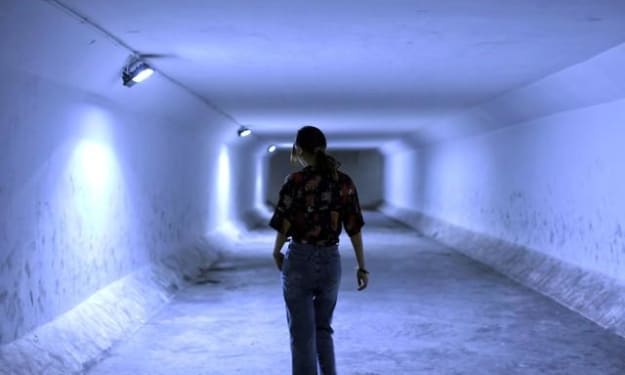How to Find Meaning in the Suicide of a Loved One
Each of us must find his/her own version of the warrior life.

On Thursday, July 21, 2011, my twenty-year-old son left work early and never came home. His body would be found six days later in a remote area overlooking the Sweetwater Canyon, a self-inflicted gunshot wound to the head, and my life would never be the same. One year later, my wife took her life.
I am called a survivor of suicide, but am I? Most days, I’m not sure I survived at all. I am not the same person I was before the suicides of my son and wife. The quest to find some meaning in my life after my son and wife committed suicide has been tumultuous. One day I feel as if I’m beginning to make sense of my life again, the next day everything returns to chaos.
Everyone deals with some level of chaos in a seemingly absurd world, but the torment of suicide casts a glaring light on chaos. Albert Camus wrote, “There is but one truly serious philosophical problem and that is suicide.”
In an incongruous twist, suicide answers the existential question: Are we in control of our lives? Suicide certainly gives us control. It might be the only thing that does. In order to take control of our lives, we must accept the inevitability of our deaths. But it requires more than the simple acceptance that we will die, it also requires a belief that we will find meaningful ways to navigate life’s absurdity. In order to be truly free from the notion of absurdity, we must concede to it.
By quieting the noise, suicide is one means of reconciling one’s life with its hopelessness and absurdity. But is it the only way? I don’t think so. In order for me to accept my role as a survivor of suicide, and indeed to find a reason to push on, I have to find the strength to reconcile my will to live with life’s absurdity. Why go on living in a world of absurdity and uncertainty? If I cannot reconcile to the absurd, I will never be free of it. And this is what we are all after, isn’t it? Freedom. In freedom we find peace. The trick is to find freedom and go on living.
In the six years since my son’s suicide, I have been on a rollercoaster of emotions, everything pointing to life’s absurdity. During the year after my son’s suicide, my wife struggled with darkness, even researching ways to kill herself. I pleaded with her, trying to convince her there was a light at the end of the tunnel. She couldn’t see it. I told her that suicide would always be there for her, but for now, stick it in her back pocket, she didn’t need to play that card yet. I hoped she would find some comfort in knowing if things became unbearable, she always had a way out, but for now, she needed to live in order to honor our son’s short life, in order to give meaning to his life. One can’t wipe out a life just like that. One day he was here, the next day he was gone. But he still existed in our memories of him. As painful as it was to think of him in the past, we needed to keep the memories alive.
One of the ironies of suicide is the belief that he has become a burden to his loved ones and through his suicide, he will relieve his loved ones of this burden, when in fact, nothing could be further from the truth. No survivor of suicide feels any sense of relief. Instead, he feels only the crushing blow of shock and devastation. My son never meant to harm anyone else by his suicide. But he did.
The night before the one-year anniversary of our son’s suicide, I was fearful of my wife’s fragile state of mind, but she seemed strong and resolved, telling me she was determined to see this thing through. She would charge up the stairs the following morning just as our son did the last time she saw him.
The morning of the day he disappeared, he was late for work, and my wife laughed as our son charged up the stairs out of breath. She told him it was no big deal, relax, sit down, drink a cup of coffee, life would wait for him. Yes, life would wait. As it turned out, it would wait an eternity. He not only charged up the stairs that morning but sometime that evening, sitting alone on an outcrop of rock overlooking the Sweetwater Canyon a hundred miles from home, he charged into the unknown. What was going through his mind during those last hours, last minutes, last seconds of his life? (How do you decide that now is the time to pull the trigger?) Would things have turned out differently if he’d heeded her advice to relax, take a deep breath, it’s no big deal, life is always there waiting for us?
None of us should ever assume life is always there waiting for us. Each day, in one way or another, we charge into the unknown. Most of the time, we are alive at the end of the day. But one day that won’t be the case. In this sense, we are all survivors, struggling to get to the end of the day. How do we make sense of it? How do we go on in the face of so much uncertainty and chaos? Constantly reminded of my son’s and wife’s suicides, this question glares at me.
Since I don’t have answers to these questions, here’s what I’ve decided I need to do to make them go away. I will become a warrior. What does it mean to be a warrior? Two things: discipline and perseverance. I need to reach a point in my life where I believe I have the right to be here. If life is filled with uncertainty, so be it. I have resolved to stay focused and alert, confident in my strength to persevere under any circumstance. After all, what is the worst thing that could happen?
At my son’s memorial, I told a friend of mine, a father of one of my son’s friends, that I’d never be afraid again. Since I had already suffered the worst thing imaginable, and, therefore, had nothing more to lose, I no longer had anything to fear. From that moment on, I’d be unconquerable.
As it turned out, however, I was anything but unconquerable. As the days went on, I felt more and more defeated, more and more vulnerable and soft-shelled. I had trouble finding any reason to go on. I added to my confusion and turmoil by my reckless behavior. Nothing made sense, so I acted irrationally. But there were consequences to my actions. Other people were hurt, people who had become involved in my life, people who cared about me, people who had even fallen in love with me. Having suffered the worst pain imaginable, the last thing in the world I wanted was to hurt anyone else. Even though the thought of hurting anyone else was lamentable to me, I craved love and companionship, fully aware of the possibility that I might never be able to commit to a long-term relationship.
Finally, I have come to realize in order to stop this self-destructive behavior and to avoid causing any more suffering to anyone else, I must find the willpower to persevere in the face of my own suffering. I must become a resilient warrior, strong and quiet and mindful. I must seek an inner peace. Only after I have quieted my mind will I begin to see the path I need to follow in order to live honestly and truthfully.
Honesty and truth are the hardest things to recognize in a world of chaos and absurdity. How do we recognize them? We won’t. Therefore, it is up to each of us to create his own sense of honesty and truth. We must settle our own discord by accepting this one simple fact: honesty and truth are not to be found in the chaos of everyday life but are created inside each of us to suit our own needs. We make our own truths. These are the truths we can follow, everything else is futile.
Each of us must find his own version of the warrior life. Only then can he begin to quiet the unrest and avoid the nagging question, “How do we make sense of life?” It isn’t up to us to find an answer to this illusory question, it is up to us to find the answer to another question: What is true for us? Only when we are armed with the belief in our own truth and honesty will we be able to focus and prepare to fight the good fight.
Ever since my wife and son committed suicide, I have been plagued by my own guilt and feelings of failure. On a conscious level, I know that I did nothing wrong, but on a sub-conscious level, I can’t come up with any other explanation for why my son and wife felt the urge to leave, other than I failed them. To suffer is my salvation, even though I know it is self-destructive. I have to forgive myself and find strength in another truth. Suffering is an uneasy truth and somehow unsatisfactory. I do not have to prove to anyone else that I did nothing wrong, I have to prove it to myself. To find my own sense of honesty and truth is the first step in becoming a warrior. Only after acknowledging my own truth will I begin the journey that will set me free.
About the Creator
David Stoner
I am a writer living and working in Longmont, Colorado. After the suicides of my son and wife, I have devoted my life to the existential examinations of the fragile human psyche in the hope I might help others find the courage to go on.






Comments
There are no comments for this story
Be the first to respond and start the conversation.